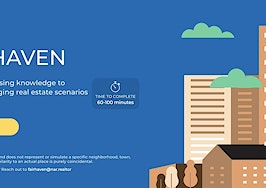Discrimination. Does that word make the hairs on the back of your neck stand up and your brows furrow? Me too. Perhaps you do not want to suffer from it, or maybe you don’t want to be accused of it.
And as I watched the New York State Senate hearing that subpoenaed some of the real estate agents named in the 2019 Newsday Long Island housing exposé, I realized that we need to cancel the use of the word “discrimination.”
Stay with me. This is not another “cancel culture” piece in that I’m not seeking to cancel people (who often need and can be restored). Rather, we can put an end to the word “discrimination” that, due to its defensive connotations, actually seeks to divide and further alienate rather than advocate for and support nondiscriminatory (aka fair) housing.
Again, think about what the word “discrimination” evokes in you. Likely, fight, flight, freeze and maybe fawn — defense mechanisms — surface for you. And there lies the problem.
Our defensives, and maybe also “our dukes,” are up. Most of us who are married or dating know that taking a defensive posture in a moment when someone feels slighted further damages the relationship as opposed to repairing it.
And, like most romantic relationships, it’s far more effective and conciliatory to speak in the positive of what we desire (even require) than in the negative of what is not happening. Similarly, I believe this philosophy may help serve more protected classes — really all people — in their pursuit of the American dream of homeownership.
So what is the positive replacement proposed? Instead of asking, “Did you discriminate?” we may see better progress with, “How are you specifically treating everyone the same?” Then, as real estate professionals, we can pull back the curtain of our systems, creating deep self-evaluation and reflection.
If our systems unveil that we are consistent in doing the same thing, the same way for every single client, kudos — we can pass “Go.” However, if we see that our systems are sporadic at best and nonexistent at worst, then we have just willingly opened our own eyes to our mishandling of fair housing, whether unintentionally or not.
That feels better.
The Newsday expose did bring to light that we still have growing to do when it comes to fair housing. But real (estate) talk, it was despicable how Newsday did it. At the resultant September 2020 hearing, the New York state senators were shocked that no disciplinary actions had been taken against the agents called out in the exposé.
Whereas, I wasn’t shocked because Newsday put those agents, their brokers and their firms on the worst type of defense (public humiliation), which is evident in the circular conversations and verbal gymnastics displayed at the hearing. (I thought I was watching a new Olympic event, geez!)
One agent even testified how her reputation — and really, her life — had unraveled in the aftermath. She seemed depressed and conceivably suicidal, which, sadly, just cannot be the end result that we are seeking as a civilized society. There is something wrong with trying to correct one societal ill or wrong by inflicting another or more.
When I teach workshops on upholding fair housing in our marketing (particularly on social media), I’m quick to say that we should help each other, too. I do not believe some of us are even aware that we aren’t treating everyone the same.
Those of us in the “some” group are likely on “autopilot” because of how we’ve been socialized in a country that has historically and legally been intolerant of the “other.”
Thus, when we see a colleague post something that treads the fair housing line, we absolutely should say something to that colleague first (before they are “called on the carpet,” because it may be simply an awareness gaffe).
You may not want to teach a workshop (and you do not have to, ha!), but so much of this is a “we need better, ongoing fair housing education” issue that our daily interactions as professionals are prime teachable moments.
Let’s use them to help each other because if the tables are turned to put the hidden cameras on us, we (who truly have no ill intent) would want someone to gently educate us on how we can do better and stay out of “hot water.”
Case in point: it was reported that none of the agents testifying could define “steering.” Yes, that’s a real estate pre-license-class basic, but many of us are many, many, many moons removed from those classes. Again, we need better ongoing fair housing education as a collective.
Should we have penalties? Of course. Is ignorance of the law an excuse? Of course not. Should we distinguish between intentional and unintentional transgressions along with explicit and subtle disparate acts and outcomes verses pro-fair-housing acts and outcomes? Absolutely.
Does the lack of intentionality absolve a person from breaking the law? No way. Yet, we do more for clients, us (as their agents) and our industry as a whole if the focus becomes improving awareness with questions like:
- How, specifically, are we treating every single client the same, every single time?
- How, specifically, can we implement better systems and routines to ensure we treat every client the same, every single time?
- How, specifically, can we make this a community of professionals all working toward the end goal of treating every client the same way, every single time? (Instead of taking the individualistic “every woman for herself” approach that we heard in the New York state senate hearings.)
As a collective that has an awareness dilemma about what it looks like to treat clients the same, particularly in these times, we can actively take the position of lifelong learners interested in giving every single client the highest quality of service every single time. The byproduct becomes fair housing for all and thriving longevity as agents.
Unfortunately, however, duality in our individual awareness of and action to promote the same treatment does exist. Make no mistake — there is still a remnant of real estate licensees who revel in racism (like this Arizona Sotheby’s agent).
Even for them (the aware, self-proclaimed racists), calling it “discrimination” is still not appropriate because it minimizes the actual laws being broken. Thus, whether it is overlooked or intentional, “discrimination” just does not fit where this moment is taking us because it either packs too much of a punch or not enough.
Language has the power to unite or divide, develop or destroy, so let’s choose our words deliberately to advance the true spirit of fair housing.
Lee Davenport is a licensed real estate broker, trainer and coach. Follow her on YouTube, or visit her website.






